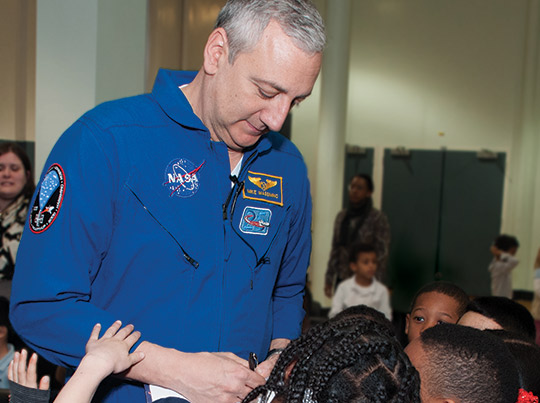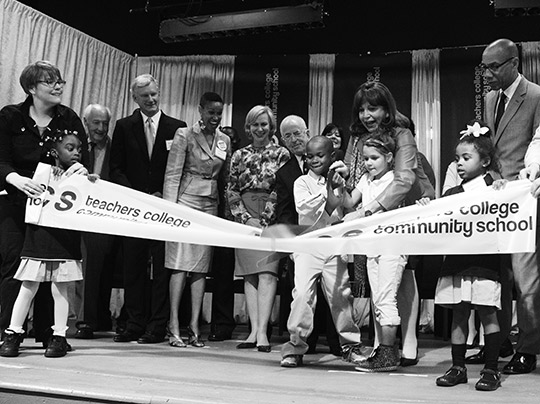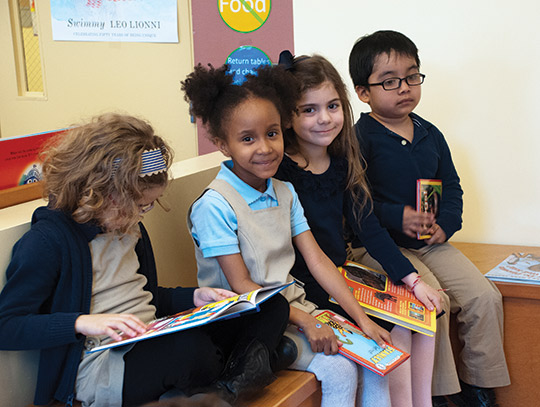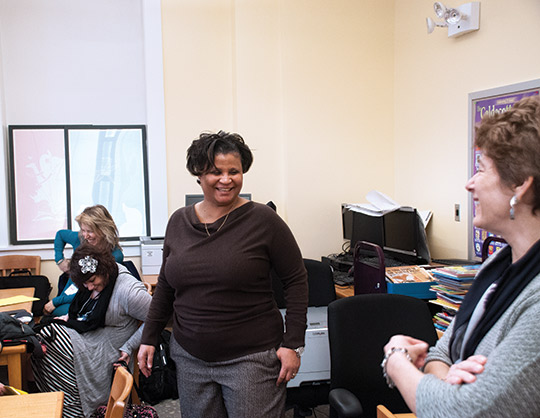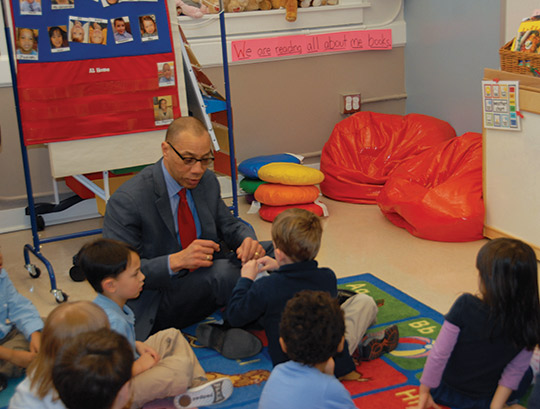A School Where Dreams Come True
Teachers College Community School is showing its students what’s possible — and the nation, too
By PATRICIA LAMIELL
Assembly at the Teachers College Community School in Harlem one chilly Friday afternoon in January was out of this world. “Astronaut Mike” — two-time NASA spacewalker Michael Massimino, whose experiences inspired the movie Gravity — dazzled star-struck TCCS students with photos of the cosmos and tales of floating outside the spacecraft in a 280-pound suit while repairing the Hubble Space Telescope.
“If there’s something you want to do, you’ve got to stick with it and keep trying,” Massimino told students. “You may have to work a lot, but dreams do come true.”
TCCS just might be the launching pad for those dreams. Opened in 2011 by the College and the New York City Department of Education, the school, which will ultimately serve grades pre-K–8, fulfills a promise made by TC President Susan Fuhrman to create and help run a public school for the College’s surrounding community. The subsequent negotiations with the city, meetings with the local community board, collaboration with Columbia, fundraising (see page 28 for founding donors)and search for the right leadership sometimes seemed as ambitious as putting human beings in space, but the results have been stellar.
“TCCS meets our moral obligation to provide the best possible education for children in the community where we live and work, but it’s also a place where we can show how the cutting-edge knowledge that we have here can be infused into regular public education,” says Nancy Streim, TC’s Associate Vice President for School and Community Partnerships.
Located in a restored red-brick building on Morningside Avenue near 126th Street, TCCS reflects the input of TC faculty in math, science music, psychology, nutrition, reading and writing, physical education and art. TC students serve as specialty and pre-service teachers, after-school instructors, classroom assistants and psychological counseling and literacy interns.
Columbia engineering students teach science classes. Four of the seven full-time teachers are TC graduates, and Principal Jeanene Worrell-Breeden, a veteran New York City school administrator who is now a TC Cahn Fellow, is widely credited with creating an inclusive culture for the school’s 166 lottery-picked students and active parent community.
“We have children of recent immigrants, children whose parents work at the Post Office, and children of Columbia professors,” says Worrell-Breeden. “It’s racially diverse, language-diverse, and all must live in Upper Harlem to go to this school. It’s a microcosm of the new Harlem.”
IT STARTS WITH FOOD
“Class, what have we been studying in nutrition?”
In the school’s basement cafeteria, the kindergarten cooking class co-taught by Jack Taliercio, a master’s degree student and instructor in TC’s Program in Nutrition, sounds like a call-and-response at a Baptist church.
“Roots,” sing the 24 children seated at long tables.
“So what will we be cooking today?”
“Roots!”
“Can someone tell me the names of some roots?”
“Potatoes!” says one boy. The children have been growing potatoes in science class.
“Beets!” says a girl.
“That’s right, potatoes and beets are roots. How about carrots?”
“Yes!”
“How about turnips?”
The children fall silent.
“Turnips are roots, too! And today, we will be making kale and basil pesto over roasted root vegetables.”
Armed with plastic chef’s knives, the children begin sawing roasted vegetables into half-inch cubes.
“I don’t like roasted carrots. I don’t like beets, either,” declares a boy as Jacqueline Zuckerberg, another TC master’s degree student in nutrition, distributes little paper cups of vegetables and pesto. Nevertheless, he gingerly tastes a tiny piece of each, before shaking his head and making a face. Zuckerberg awards him an “I Tried It!” sticker for his shirt.
“The important thing is to make sure kids get to prepare healthy food,” says Zuckerberg, whose TC professors, Isobel Contento and Pamela Koch, designed the TCCS nutrition curriculum. “The research shows that unless they get hands-on experience, they’re not going to behave differently when it comes to what they eat.”
Call-and-response is also the motif in second grade music class, where Tim Sullivan, a jazz musician and Ed.M. student in TC’s Music and Music Education program, explores the difference between loud and soft. The children sit in a circle while Sullivan, accompanied on an upright piano by Christian Nourijanian, a master’s degree student in the same program, asks in song for each child’s name.
“Max, Max, Max, Max, Maxwell!” the children shout as Max Myers leaps up and dances in front of his chair. Sullivan continues around the circle until each child has jumped, squatted, laughed and spun to Nourijanian’s jazz riffs. Next, he pulls a brightly painted pair of conga drums and a tambourine down from a high shelf.
“Which of these instruments do you think is the loudest?” he asks. He tasks Anna Bomwell with playing the congas and Meagan Scott with playing the tambourine. The class declares the tambourine louder — which is correct, Sullivan explains, because the head of the tambourine is tighter and smaller, permitting a much brighter and more resonant sound than the long, deep, cylindrical conga drums.
TCCS is distinguished by its emphasis on “a developmental view of what music communities look like,” says Lori Custodero, Associate Professor of Music and Music Education, who designed the school’s music curriculum. “In pre-K, we might do activities that have less structure and more freedom to honor their desire for exploration. In kindergarten, there’s more interest in patterns and form, while in first grade, they’re starting to decode the internal literacies of our com¬munity and music’s symbolic nature.”
WORDS AND ACTIONS
“Hola, ¡Bienvenidos a todos!” Bobby Cox, TC psychology student and certified Spanish teacher, welcomes second-graders to his fifth-floor classroom. Today’s focus is on words for family members: abuelo, abuela, madre, padre, tío, tía, primo, prima. Cox asks the kids to say the names of their primos and primas (male and female cousins) in Spanish and then draw an árbol familiar (family tree), with the oldest people at the top.
“We know that we use portfolio grad¬ing in here,” Cox tells the children. “That means your carpeta [folder] is like a portfolio. Imagine that this family tree is going into your carpeta. I want you to act as if this work, this árbol familiar, is going out in the hallway. So don’t hurry up through it, don’t do it sloppily. Write in your best handwriting; think about the quality.”
Cox cites TC’s emphasis on task-based teaching — an approach to second-language acquisition that improves language retention by compelling students to solve specific problems in a real-world context — as a way to increase not only skills but respect for other cultures.
“A lot of people are hesitant to use as much Spanish in the classroom as I do, but my goals are exposure to the language, appreciation of being bilingual, and respecting people who are different from us and realizing that there’s a lot we can learn in difference.”
At the same time, Cox looks for ways to inculcate strong work habits in his students and encourage them to view themselves as scholars. Hence the carpetas, which he requires the children to carry to and from their cubbies every day. “I could keep them in the classroom,” he says of the folders, “but when the kids have to keep them current and review them with me, they take more responsibility.”
Attention to such details is part of a broader school culture that reflects extensive input from TC.
“At TCCS, the College can practice in a way we were never able to do in public schools before,” says Marla Brassard, TC Professor of Psychology and Education. “We can run psycho-educational groups, we can do comprehensive assessments, we can consult with teachers, we can individually counsel kids. It’s a game-changer for everyone involved.”
LEARNING FOR THEMSELVES
The dismissal bell has long since rung, but a dozen children, age five to seven, sit hunched over counters in the science and art room. Wearing hand-decorated lab jackets, they’re experimenting to see whether pulverized iron-fortified cereal, mixed with a little water and placed in a baggie, can be dragged across the table by magnet. (It can, but slowly.)
“Scientists ask questions,” Charlotte Vinson, a TC master’s student in science education, tells the students. “Then they work until they find the answers.”
With American students falling behind other countries in science, the onus is on elementary schools to engage kids in the subject as early as possible.
“Elementary school teachers typically aren’t required by states to specialize in a science, so most lack both general knowledge of science and the ability to develop and execute science lesson plans,” says Felicia Mensah, TC Associate Professor of Science Education.
At TCCS, under Mensah’s guidance, teachers learn hands-on classroom activities that both engage and impart science knowledge and content. They can draw on a database of science web-sites with interactive simulations and digital games that illustrate key scientific principles. Mensah also encourages the teachers to work with one another and with parents as well.
“The teachers and staff aren’t afraid to try something new,” says Christine Kovich, whose daughter is in kindergarten at TCCS. “And parents are highly involved.”
Kovich is Executive Director of HYPOTHEkids, the school’s hands-on science program, which she co-founded with current TC doctoral student Erika Gillette. She and husband Sam Sia, who teaches biomedical engineering at Columbia, helped bring Astronaut Mike to TCCS.
LAST BELL
Late on Friday afternoon, the school is quiet. In her spacious, high-ceilinged office just off the lobby, Principal Worrell- Breeden, sitting for the first time all day, recalls initially wondering how serious TC was about partnering with the school’s teachers, administration and parents.
“On the one hand, I worried they might simply take over,” she says. “And on the other, I wondered whether they would be a presence at all.”
Instead, she says, TC has provided her with unprecedented resources, support and help when she’s needed it and otherwise has gotten out of the way.
“Every college that has a teacher prep program should walk the walk, talk the talk and provide a place to espouse the best practices you’re teaching your students,” she says. “No other New York City public school does this. We’re pioneers.”
To support TCCS, please contact Scott Rubin at 212 678-3722 or srubin@tc.edu
Published Tuesday, Jun. 3, 2014
